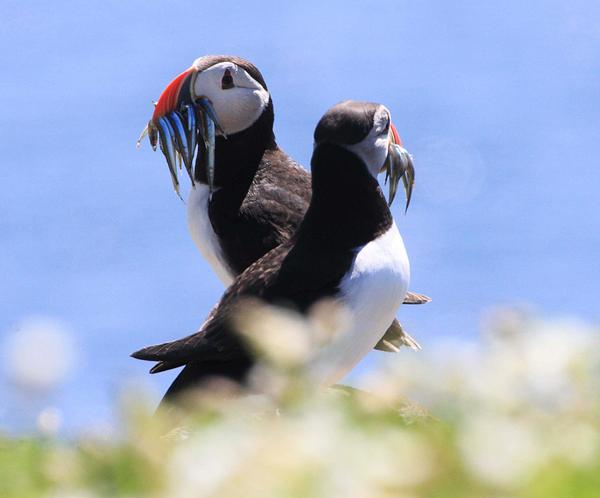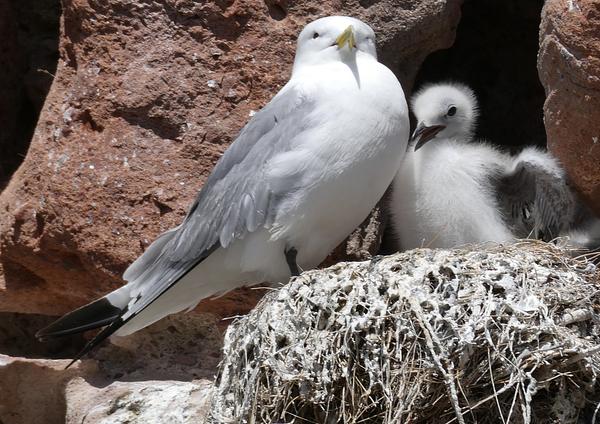_Nicol_Nicolson.jpg)
Sandeel fisheries closures
Scottish Government proposal welcomed
Seabirds under pressure
Scotland’s islands and coastal cliffs are home to a wide range of seabirds. Our seascapes come alive in the spring and summer as many migratory seabirds return to breed; creating a cacophony of noise as they swirl around their nesting sites. Yet, despite their international importance, many of our seabirds face an increasing number of threats through climate change impacts, invasive species, marine pollution, marine developments (including offshore wind) and unsustainable fisheries.
A national seabird indicator, which tracks the numbers and breeding success of 15 seabird species, in Scotland shows that breeding numbers in 2019 were down by 49% on the levels recorded in 1986. Arctic skua have suffered the most significant declines at 78% but other species, such as black-legged kittiwakes and common guillemots had suffered a long-sustained period of decline. Avian flu is a further significant pressure which ravaged great skua and Northern gannet colonies in 2022 and has been taking its toll on species such as guillemots and black-legged kittiwakes along the East coast of Scotland this summer.

Given these declines we believe it is important to take steps to reduce pressures where we can. That is why we welcome the Scottish Government’s proposal to close fishing for sandeels in all Scottish waters. We highlight a few key messages and details on how to respond to the consultation at the end of this blog.
Benefits of a sandeel fishery closure
Sandeels are one of the most abundant and important forage fish in the North Sea and play a key role in North Atlantic marine food webs. Changes in their distribution and abundance have knock on effects both up and down the food web (from plankton to top predators such as seabirds).
They are an important fishery to some EU member states, in particular Denmark, who regularly fish the stock in UK waters in spring/early summer. They process their catch for oil and fish meal, which is used in many types of food for human and animal consumption. The impact of a closure on the Scottish fishing fleet would be beneficial as the sandeel stock would be protected and wider ecosystem benefits would result, including for commercial fish species such as cod, whiting and haddock. Iconic wildlife associated with Scotland’s culture such as our seabirds, seals, whales, dolphins and porpoises would all benefit given their dependence on sandeels as a nutritious oily food source.
Sandeel protection
Sandeel fishery closures are not an entirely new approach. Since 2021 measures have been in place in Zone 4 of Scottish waters - an area along the East coast of Scotland which includes important seabird colonies in the Firth of Forth. This initial closure was in response to the scientific evidence linking low sandeel availability to poor breeding success for species such as black-legged kittiwake.

Sandeels and/or their sandy habitats are also a protected feature in Marine Protected Areas around Scotland and the rest of the UK. This current proposal would however extend the closures across all Scottish waters ensuring the supply of young to replenish the stock.
Are the benefits clear cut?
It is fair to say that the direct relationship between a sandeel fishery closure and seabird numbers is not entirely clear cut. This is due to the complex relationships that seabirds have with the wider marine environment and the wider range of pressures they face. Nonetheless, if we can maximise the availability of sandeel as a prey for seabirds it should help to increase their resilience to these wider pressures by helping the adults to maintain their condition for breeding and to find enough food to feed their chicks.
Responding to the consultation
The proposal to close sandeel fisheries is being considered at both Scottish and the wider UK level. We will be responding positively to the Scottish Government’s consultation and hope that you will join us in doing so too.
Key points to consider including in a response are:
- Sandeels are a key component of our marine food webs yet they are under pressure from climate change and so it is important to take steps to reduce other pressures – such as unsustainable fisheries to help the sandeel stock to recover and continue to play its part in the marine food web.
- Scotland is home to over 70% of the UK’s seabirds and is important in global terms for many species. It is recognised at international levels that seabirds are the group of vertebrates that are in most trouble with pressures coming from climate change, invasive species and unsustainable fisheries.
- Even some marine offshore renewable developments are predicted to have a significant negative impact on threatened seabirds (for example the SSE Renewables Berwick Bank offshore development is predicted by the developers to lead to a loss of 699 kittiwake, 1230 common guillemot, 70 razorbill and 30 puffins every year of its 30 year lifespan).
- Our seabirds have come under additional pressures following the recent outbreak of highly pathogenic avian flu which has decimated many colonies. This disease now appears to be persistent in our environment which means future outbreaks are not unlikely. We need to build resilience into our systems where we can.
- The proposal to close sandeel fisheries in Scottish waters is significant and welcome. We also want to stress that it’s important for Scottish Government to follow through on its commitment to produce and consult on a Seabird Conservation Strategy which is now long overdue.
Consultation responses - to up to 6 questions - can be submitted either via the online Sandeel fishery closure portal or by email to sandeelconsultation@gov.scot before the 13 October 2023.
- Listing image copyright (c) David Steel, NatureScot
- Header image copyright (c) Nicol Nicolson
